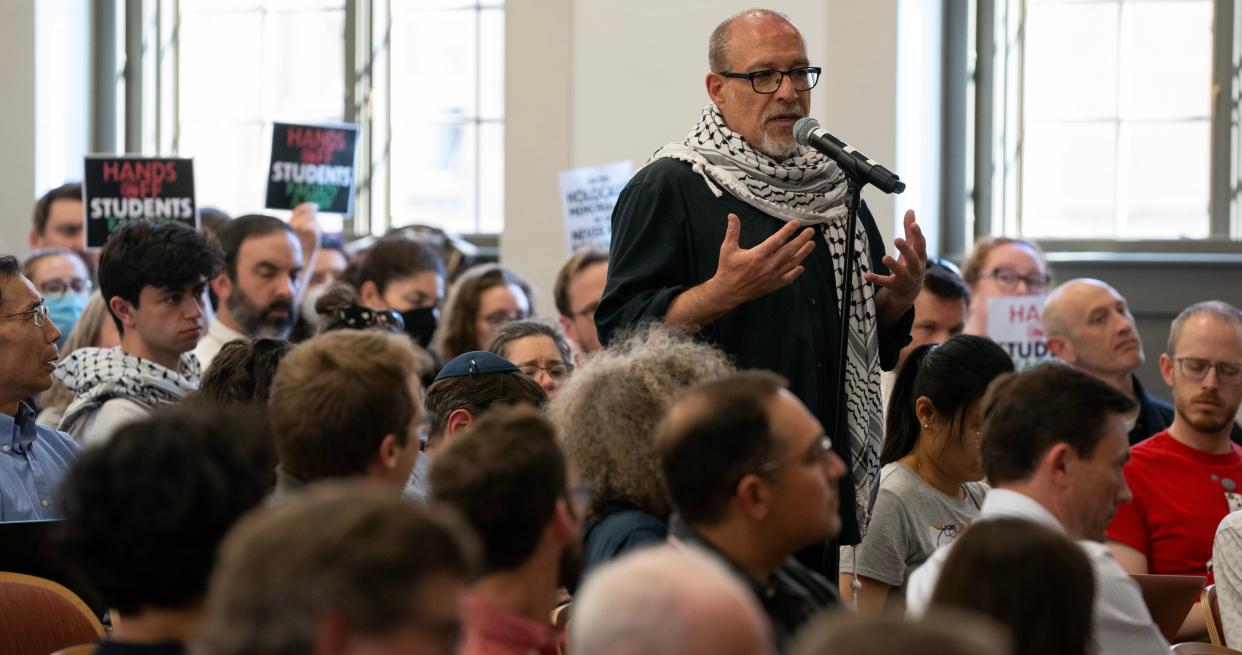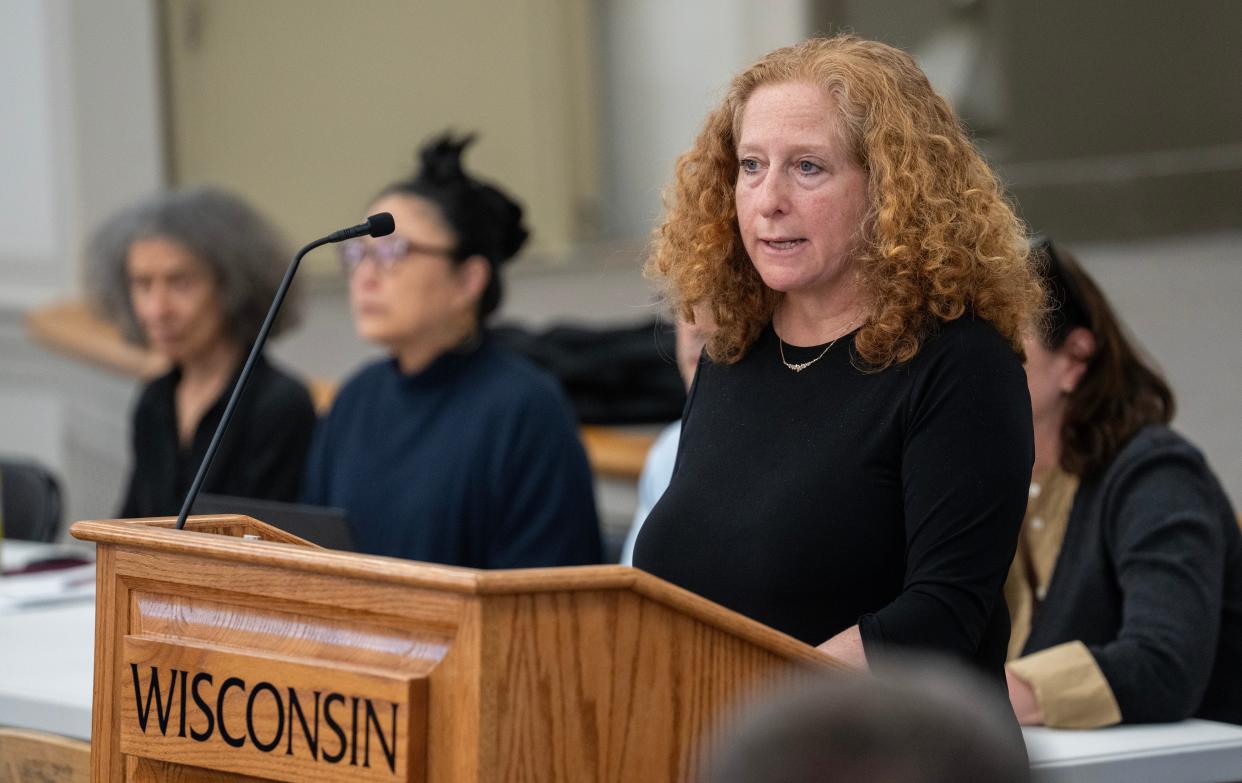Professors confront UW-Madison chancellor over police response to encampment
MADISON − University of Wisconsin-Madison professors confronted Chancellor Jennifer Mnookin on Monday over a decision last week to send in police and break up a pro-Palestinian encampment on campus.
At the last scheduled Faculty Senate meeting of the school year, one professor spoke of the "sense of unbelievable betrayal" to see videos of her colleagues bloodied and bruised by police last Wednesday. Another demanded an apology from administrators and called for an independent review. A third, moved by the protesters who packed the meeting room, vowed to finally visit the encampment and see for herself what it was about.
“The police intervention was disproportionate, unnecessary and initiated by the unilateral action of university administration," said Professor Keith Woodward, who spoke on behalf of the geography department.
Mnookin, in her first public remarks since protesters pitched tents April 29, said law enforcement action against the campus community is "the last thing" a chancellor ever wants to do.
"I want to acknowledge how painful it has been for so many of us, including me, to have had the kinds of interactions with our students and some of our faculty this past week that none of us would ever choose," she said.
Visibly emotional at times, Mnookin, who is Jewish, said she is increasingly concerned about reports of incendiary rhetoric, the potential for violent conflict with outside groups and "the risk of seeing this entire situation spiral out of control."
In just the past few days, UW-Madison received reports of Islamophobic messages near the encampment and antisemitic messages scrawled on the sidewalk in chalk at the Dane County Farmer's Market. Two student organizations, Mecha de UW Madison and Anticolonial Scientists, are temporarily suspended and under investigation for the chalkings, some of which endorsed violence and supported terrorist organizations.
State rules ban camping on campus property unless designated by the chancellor. Mnookin said making an exception for pro-Palestinian protesters would open the door for any and all groups to set up camp on campus. As a public university, UW-Madison must remain "content-neutral" in decisions about about what's allowed on campus grounds.

"Those of you who think that I should simply let this encampment stay, I ask you: Imagine that the protesters were there for a cause you did not share, or one to which you were deeply and profoundly opposed?" Mnookin asked. "Would you think and want the same? If not, you are proposing that we violate the First Amendment."
UW-Madison professors, departments, groups weigh in on police response to encampment
Safety concerns aren't imaginary to Mnookin, who spent 17 years at the University of California-Los Angeles before moving to Madison in 2022. What happened last week at UCLA, where counterprotesters attacked protesters and their encampment for hours, "shows in severe terms that the risks are not fanciful or hypothetical," she said.
One professor, who is Jewish, voiced his support for Mnookin's remarks at the meeting. Another thanked her for meeting with student protesters to discuss their demands. Others were upset and reflective.
"This past week has been extremely difficult but also equally heartening," said Gabrielle Cornish, an assistant professor of musicology. She shared her horror of witnessing her students and colleagues' arrests and her pride in the empathy encampment-dwellers have exhibited.
Some individual academic departments and campus groups have issued their own statements. The English Department, for example, objected to the police intervention and expressed frustration in university leadership. The university's chapter of the American Association of University Professors also condemned the police force, saying the actions were "deeply damaging" to UW-Madison's tradition of open inquiry and activism.
Hundreds of protesters marched from the encampment, up Bascom Hill and into the meeting room in Bascom Hall. They sat facing Mnookin, holding signs that read "Divest" and "Hands off my students and colleagues."
UW-Madison negotiating with student protesters over divestment demand, ending academic programs tied to Israel
Within hours of police tearing down all but a few tents on May 1, protesters responded by pitching even more tents.
The encampment of more than 50 tents has become more organized over the past week. Check in at the "welcome center" and take note of the community guidelines posted on a wall of Memorial Library. Walk through the food tent using the clearly marked entrance and exit signs. Run into a problem? Talk to a designated "safety marshal."
UW-Madison hasn't immediately moved to take down the tents a second time, which Mnookin said was because of the significant safety risks to all involved in doing so. Administrators have met with protesters several times over the past week, hoping for a swift resolution.
Addressing some protesters' demands at the meeting, Mnookin said she had no control over the university's endowment, which is managed by a foundation affiliated with UW-Madison.

"I think I speak for many of those here when I say that we don't care: Make it happen," said UW-Madison sophomore and protester Adam Donahue. He suggested Mnookin show up on foundation managers' doorsteps, pull a political favor or do whatever it took.
Protesters have also demanded eliminating specific programs, including the US-Israel Binational Agricultural Research and Development Fund and the Mosse graduate exchange fellowship. Mnookin said doing so would violate state law and run counter to the university's free exchange of ideas.
Citing complexity in the ongoing negotiations with protesters, Mnookin declined to take questions from faculty or reporters. She said the university is working to find ways for protesters to share their views with people who have more "direct authority" over their demands.
This article originally appeared on Milwaukee Journal Sentinel: UW-Madison professors denounce police response to encampment, protests
